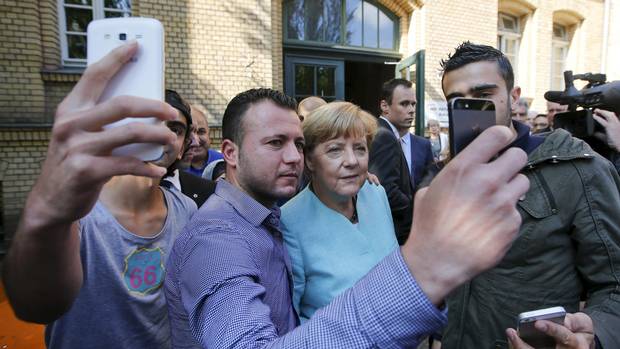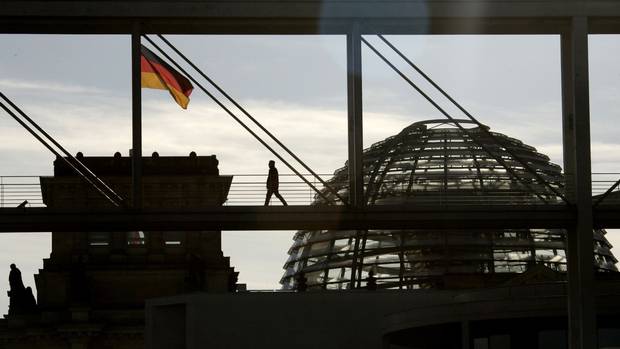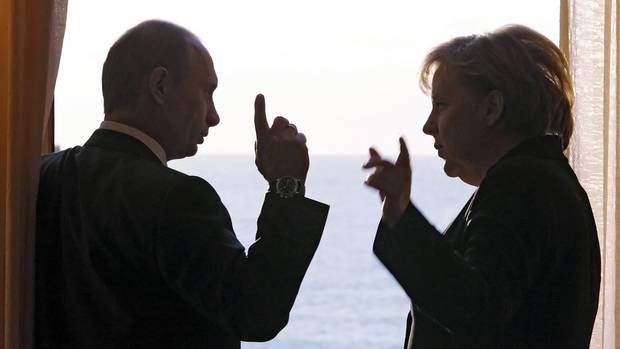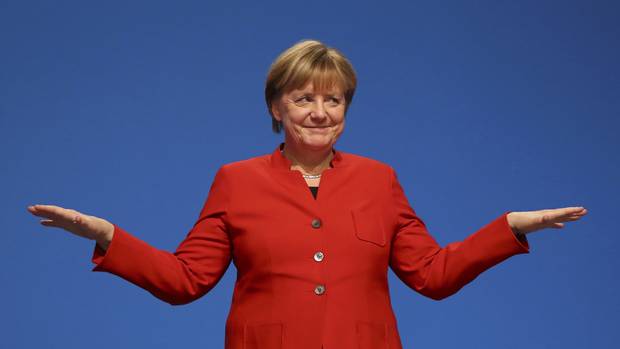There are, in the words of outgoing U.S. Vice-President Joe Biden, two lonely defenders of what remains of the "liberal international order" – Canada's Justin Trudeau, and German Chancellor Angela Merkel.
In truth, only one of those players has anything close to global sway. And while Ms. Merkel has said it's "almost absurd" to suggest she must take on a bigger role in the wake of Donald Trump's election win in the U.S., Germany under Ms. Merkel does seem a rare island of stability in a swirling populist storm.
So far.
If 2016 was defined by Mr. Trump's controversial run to the White House (and by charges that racist groups, with a big helping hand from the Kremlin, helped get him there), many fear that the coming year will see an attempted repeat of that upset – this time in Germany.
Nine months before an expected September election, Germany's long-serving chancellor has a wide lead in the polls as she pursues a fourth term in office. Then again, so did Hillary Clinton at this point in the U.S. race.
The similarities really become clear when looking at the forces conspiring against the 62-year-old Ms. Merkel.
Her party, the centre-right Christian Democratic Union, has roughly a 10-point lead. If that margin is lost, it will almost certainly be because the anti-immigrant Alternative for Germany (known by its German acronym, AfD) – which has seen its popularity rise alongside public discontent with Ms. Merkel's decision to open the country's borders last year to hundreds of thousands of asylum-seekers – has stolen a large chunk of the CDU's support.
The possibility of an AfD breakthrough grows bigger with each act of violence attributed to refugees or migrants.
The Dec. 19 truck attack on a Berlin Christmas market, which killed 12 and injured dozens more, was carried out by a Tunisian whose asylum application had been recently denied. It came at the end of a year already marred by an axe attack on a train (in which five people were injured) carried out by a Pakistani asylum-seeker, as well as by Germany's first suicide bombing (15 people were injured), which was carried out by a Syrian refugee. Plus there were the horrific mass sexual assaults, which police blamed on men of "Arab or North African appearance," that took place last New Year's Eve outside the main train station in the city of Cologne.
One headline here called the Christmas market carnage "An attack on German stability" – and that stability is precisely what many Germans feel is in question as election season opens.
The stakes are extreme. After Mr. Trump's win – and the United Kingdom's referendum vote in June to leave the European Union – "the West," as it has existed since the end of the Second World War, is in unprecedented disarray. Germany and, some say, its long-serving chancellor have never mattered more.

Migrants from Syria and Iraq take selfies with Ms. Merkel after their registration in Berlin on Sept. 10, 2015. Anti-immigrant populism could play a key role in deciding Germany’s election, as it has in several other European countries recently.
FABRIZIO BENSCH/REUTERS
Rise of populism
Mr. Trump's early foreign-policy remarks have unsettled policy-makers around the globe. Europeans, in particular, are disturbed to see a U.S. president-elect who questions the value of the NATO alliance while expressing admiration for Vladimir Putin's Russia. Mr. Trump has also criticized Ms. Merkel for "ruining" Germany by allowing so many refugees and migrants into the country.
There are worries that 2017 could deliver more shocks to what remains of the established world order. In Europe alone, March could see the rise of a government in the Netherlands headed by outright Islamophobes in the form of the Party for Freedom. May could bring an even bigger jolt, with Marine Le Pen, the leader of the far-right National Front, expected to be one of the final two contenders for the French presidency. (The other candidate likely to make it to the second-round vote is Republican nominee François Fillon, who, like Ms. Le Pen, favours better ties with Moscow.)
Italians, who already threw one thunderbolt in December when they voted No in a constitutional referendum, triggering the resignation of Prime Minister Matteo Renzi, are also expected to go to the polls some time in 2017. When they do, all eyes will be on the fast-rising Five Star Movement, the latest populist party to resonate with voters fed up with the status quo.
The lines linking the U.S. election to the German one are the same ones that connect the French and Italian votes: anti-immigrant populism, and allegations that it's the Kremlin that benefits as the anti-establishment candidates rise. (In Germany, with an economy that has fared consistently well over the 11 years Ms. Merkel has been in office, there's less grumbling about the ills of globalization than in parts of Europe and the U.S. that feel left behind.)
It's not hard to imagine a G7 meeting in the near future where newly sworn-in U.S., French and Italian governments all favour better relations with Russia. In such an increasingly likely scenario, Western sanctions against Russia – imposed following Moscow's 2014 annexation of the Crimea Peninsula, and its support for separatist armies in eastern Ukraine – could rapidly collapse, handing Mr. Putin a major strategic gain.
"We have Brexit, we have Trump, we will have either Fillon or Le Pen in Paris," said Olaf Boehnke, a freelance foreign-affairs adviser to several German and European politicians. "There is no one you can really share leadership with. There's only really Merkel."
But Germans – still scarred and apologetic over their country's Nazi past – remain anxious about being seen seeking any kind of leadership over their neighbours. (The narrow defeat of far-right leader Norbert Hofer in Austria's Dec. 4 presidential election was hailed with a relieved "Phew!" on the front page of Germany's Die Welt newspaper.)
Many in Berlin believe the careening international situation left Ms. Merkel – a woman deeply influenced by her upbringing in the former East Germany – feeling she had no choice but to run for a fourth term in office.
"In the current political environment in Europe, there was no other way for the daughter of a Protestant pastor raised in [East Germany] but to run for another term," said Ralf Welt, head of Dimap Communications, a political consulting and polling agency based in Berlin. "Europe needs her as an anchor."
What kind of global leadership Germany could provide is an open question, however. While Germany boasts the fourth-largest economy in the world, the country's military remains relatively small compared to that of neighbours Russia, France and the U.K., lacking the aircraft carriers or nuclear arsenal to broadcast strength beyond Europe. The country's culture is widely admired – Germany often jousts with Canada atop lists of the world's most popular countries – but the absence of a United Nations Security Council veto means Berlin's diplomatic voice often isn't widely heard.

The Reichstag bulding, the seat of the German lower house of parliament, is shown in Berlin.
FABRIZIO BENSCH/REUTERS
Political headwinds
Ms. Merkel once vowed she didn't want to overstay her welcome on the political stage the way her mentor, Helmut Kohl, had done, in lingering for his own fourth term as chancellor. And it's far from a sure thing that Germans will hand her another stint in office.
Germany's electoral system – in which half of MPs are directly elected, and the other half selected from party lists – almost always results in minority governments requiring one or more coalition partners.
The centre-left Social Democratic Party (SPD), which has served in a grand coalition with the CDU since 2013, has indicated that it would prefer to replace Ms. Merkel with its own chancellor, perhaps Martin Schulz, the current president of the European Parliament in Brussels. The SPD could well wind up in a position to depose Ms. Merkel, particularly if it allies itself with The Greens and The Left, the latter being the successor party to the Communists who ruled former East Germany.
Ms. Merkel's hopes of remaining in office largely depend on being able to fend off the challenge from the AfD, which polls suggest has about 15-per-cent support, making it the third-most popular party in Germany after the CDU and SPD.
"It will be a very harsh, a very critical – I would even say brutal – election campaign," Stephan Mayer, an MP and spokesman on domestic policy for Ms. Merkel's government, said in an interview. "Alternative for Germany is a challenge for all the parties, but especially the CDU."
To help meet the AfD challenge, Ms. Merkel is busy repositioning her own party – which drifted to the political centre during the first 11 years of her chancellorship – back to the right. She shocked many supporters in December by announcing her support for a proposed ban on the burka, the Islamic head-to-toe covering.
More significantly – after 15 months of telling Germans worried by the large number of new arrivals that "we can do this" – she came close to admitting she'd made a mistake in opening the borders, and she declared that the 2015 refugee influx should never be repeated.
Beatrix von Storch, a leading AfD politician, said Ms. Merkel's reversals are proof that her own party is in line with the public mood over the refugee crisis.
"We've been blamed for being right-wing extremists and I-don't-know-what … and now they're picking up our ideas," Ms. von Storch said an interview. (The AfD has also called for a ban on minarets, as well as broadcasting the Muslim call to prayer in Germany. The party also wants the country's Muslims to declare that German law supersedes Islamic sharia law.)
Using rhetoric reminiscent of Mr. Trump's attacks on the American establishment, Ms. von Storch – who was one of seven AfD members elected to European Parliament in 2014 – said Germany's political and media leaders created a deep split in the country by welcoming so many Muslim refugees and migrants, then exacerbated that social divide by condemning all criticism of the new arrivals as "racist."
"When I make the point that Islam does not belong in Germany, this is supported by 35 per cent of the people. It's a minority, but it's large enough that you can't ignore it. They ignored it and they split the country," she said.
There is indeed a widespread feeling that Germany has been bending too far in its effort accommodate the newcomers.
"If you're here in Germany, we have our culture and it needs to be respected," said Cornelia, a 51-year-old who refused to give her last name but suggested she would vote for the AfD next year. "The schools have to adjust to [the refugees'] culture by eliminating pork from menus and having a multicultural atmosphere, but how does that make the Germans who have been here [longer] feel?"
She was touring another of Berlin's famed pre-Christmas markets – just days before the Dec. 19 attack on the Breitscheidplatz market – with two friends from Brandenburg state in the east of the country. "The situation is pretty bad in Germany," added 58-year-old Marion, who also wouldn't give her last name. "We're paying for all these refugees, who aren't working, and we're not getting anything in return."

Russian President Vladimir Putin talks with Ms. Merkel during a meeting at the Russian presidential residence on Jan. 21, 2007.
ITAR-TASS/PRESIDENTIAL PRESS SERVICE/REUTERS
Russia and Putin
Another battle line between the CDU and the AfD is Ms. Merkel's staunch opposition to Mr. Putin's border-altering revanchism in Ukraine. Ms. von Storch, whose party is actively seeking the support of 2.5 million Germans of Russian descent who predominantly live in the east of the country, said the sanctions war with Moscow was bad for the German economy. She said her party sought "good relations" with Russia, which she said was only "defending its regional interests" in Ukraine.
That position neatly corresponds with Moscow's. Russia, in turn, is seen as boosting the AfD's though Kremlin-owned media such as the Sputnik news service and RT (Russia Today) television channel, both of which have German-language editions that often highlight stories of crimes allegedly committed by refugees and migrants, rather than tales of peaceful integration. (One famous case that provoked far-right protests involved a 13-year-old girl who Russian media said had been kidnapped and raped by migrants. The girl later told German police that the story wasn't true.)
The Kremlin has already been elevated to the status of global bogeyman by the CIA's assessment that it deliberately intervened in the U.S. vote to aid Mr. Trump. And Germany's domestic intelligence agency has warned that it sees evidence of a concerted hacking and disinformation campaign intended "to influence the federal election next year" and "to weaken or destabilize the Federal Republic of Germany."
Russian hackers are blamed by German intelligence for a 2015 hacking attack on the country's parliament – one that could lead to the exposure of embarrassing secrets during the coming election campaign – as well as an attack in December that saw 900,000 Germans briefly lose access to their smartphones and modems.
"I think Russia will try to interfere in this election. It hasn't even started, and they already support left– and right-wing groups. There's disinformation on social networks that's pushed by the Russian side. I think there will be more cyberattacks, maybe to try and get more info for WikiLeaks, although I think Merkel is a much more boring person than Hillary Clinton," said Stefan Meister, a Russia expert at the German Council on Foreign Relations.
Mr. Meister said Ms. Merkel – a fluent Russian speaker – was "the only one who challenges Putin" on the international stage. She's also the only leader who has been around nearly as long.

Nine months before an expected September election, Ms. Merkel has a wide lead in the polls as she pursues a fourth term.
KAI PFAFFENBACH/REUTERS
Looking forward
Germans may express some fatigue when you ask them about Ms. Merkel's lengthy rule, but a large number also agree with the assessment that this isn't the time to change leaders and add to the swirling sense of instability.
"She's very important for Europe. She's holding it all together," said Jens Claussen, a 63-year-old retired hotelier, as he sipped mulled wine with his wife outside Berlin's 19th-century Konzerthaus.
Mr. Claussen said he had never voted CDU in the past but – alarmed by the rise of populists in other parts of the continent – would do so in 2017, hoping to help return Ms. Merkel to office. "She's still the one."
On his farewell trip to Europe in late November, U.S. President Barack Obama expressed much the same sentiment. "I think she's been outstanding," he said, praising Ms. Merkel for "her integrity, her truthfulness, her thoughtfulness, her doing her homework.
"If I were here and I were German, and I had a vote, I might support her," he said, drawing laughter from the American and German press corps.
Then – perhaps remembering the anti-establishment mood of the times – Mr. Obama added a regretful caveat: "But I don't know whether that hurts or helps."
Mark MacKinnon is The Globe and Mail's senior international correspondent, based in London. Follow him on Twitter: @markmackinnon
MORE FROM THE GLOBE AND MAIL



